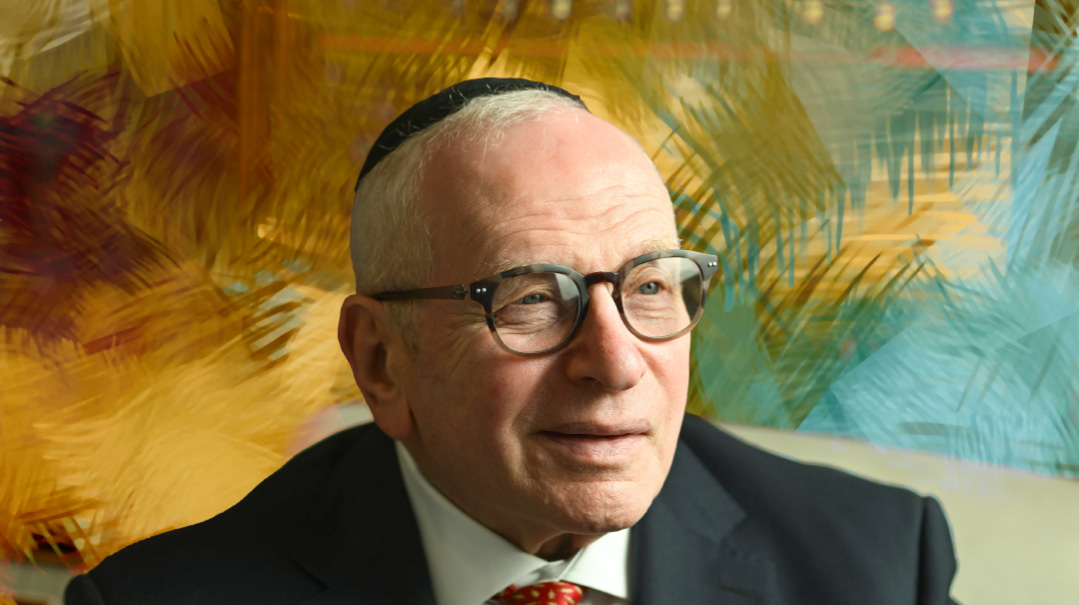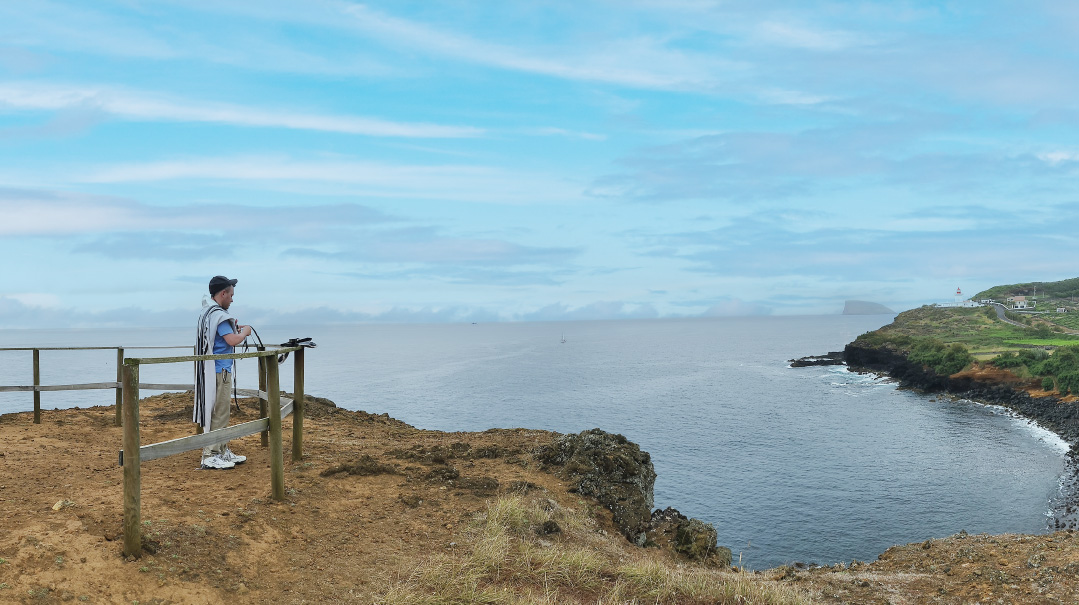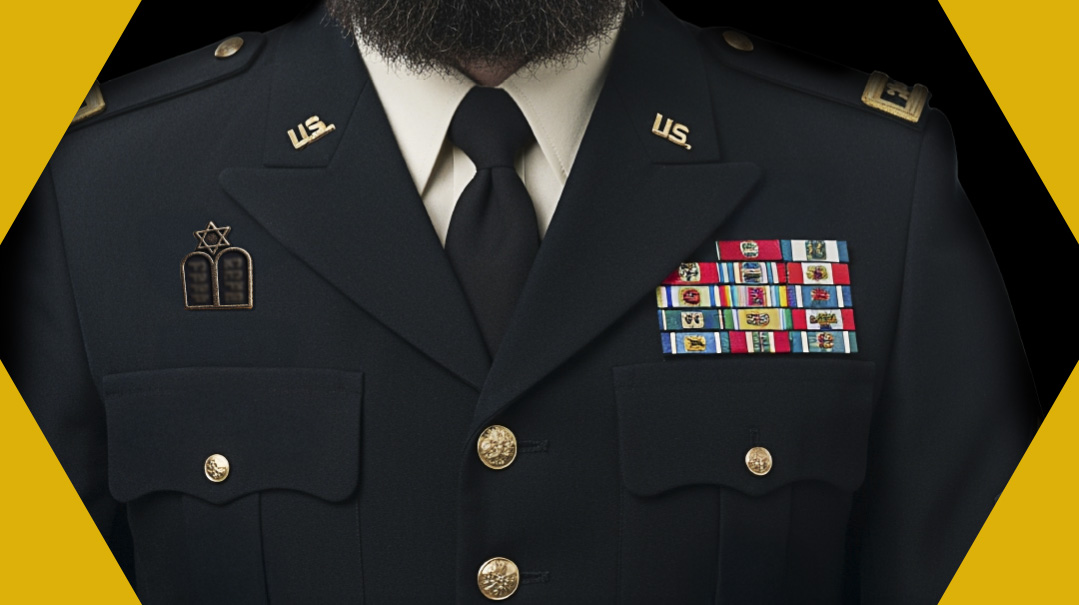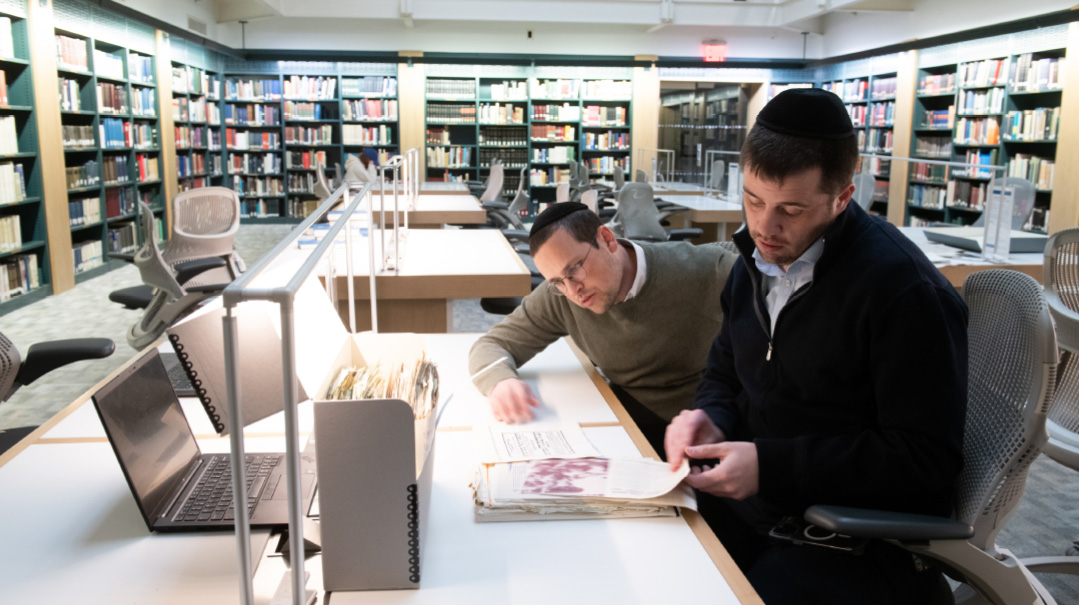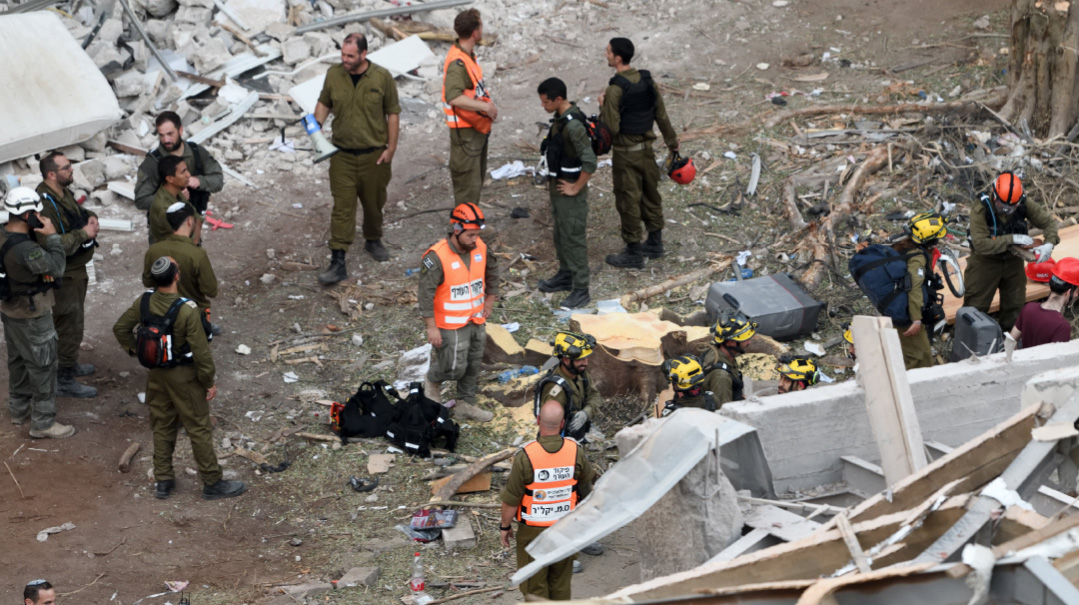Saba’s Sentinels

Yanky and Aryeh Kanievsky relive their years at Rav Chaim’s side
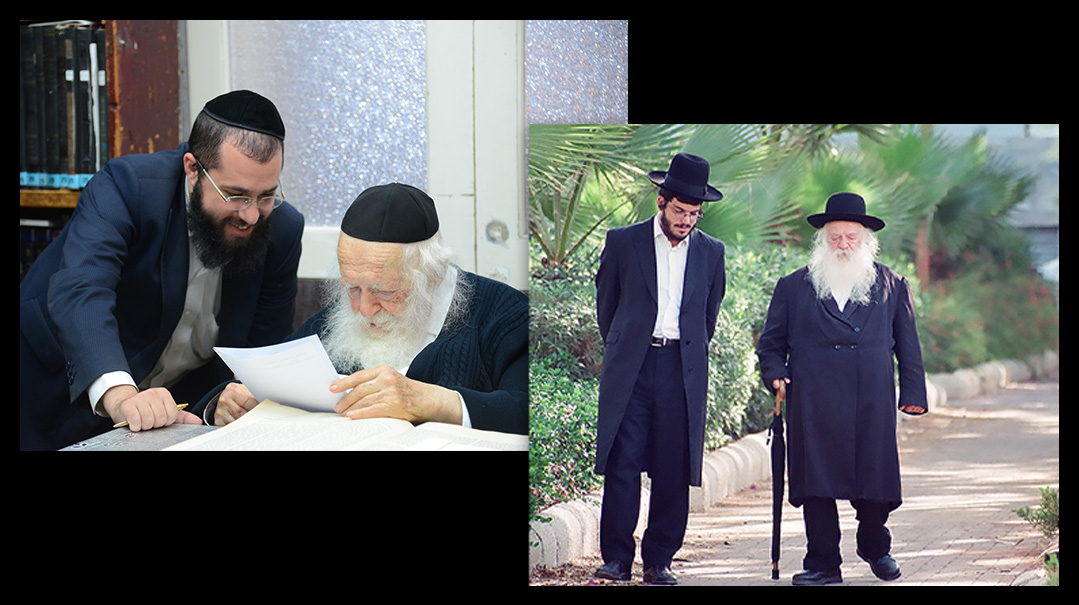
Photos: Pinchas Emmanuel, Family archives
Masses of people — relatives, family friends, rabbanim, and of course, curiosity seekers — pack the street approaching 23 Rashbam in Bnei Brak. There is disbelief mingled with the grief as people of all stripes converge on the little room, seeking to pass for even a moment through the place that served as a beacon for Torah Jewry for so many decades. Behind the crowds are two familiar faces: Yanky Kanievsky (son of Rav Yitzchak Shaul, who edited many of his father’s works) and Aryeh Kanievsky (son of Rav Avraham Yeshaya, an editor of the Steipler’s works and head of a yeshivah for baalei teshuvah) — two cousins who hovered over their zeide, managing the crowds, making sure Rav Chaim wasn’t overexerted, and essentially being there for all his needs. Now that the job is over, they’re trying to put the past and future into perspective
Reb Yanky Kanievsky
“He Had Time for Everything”
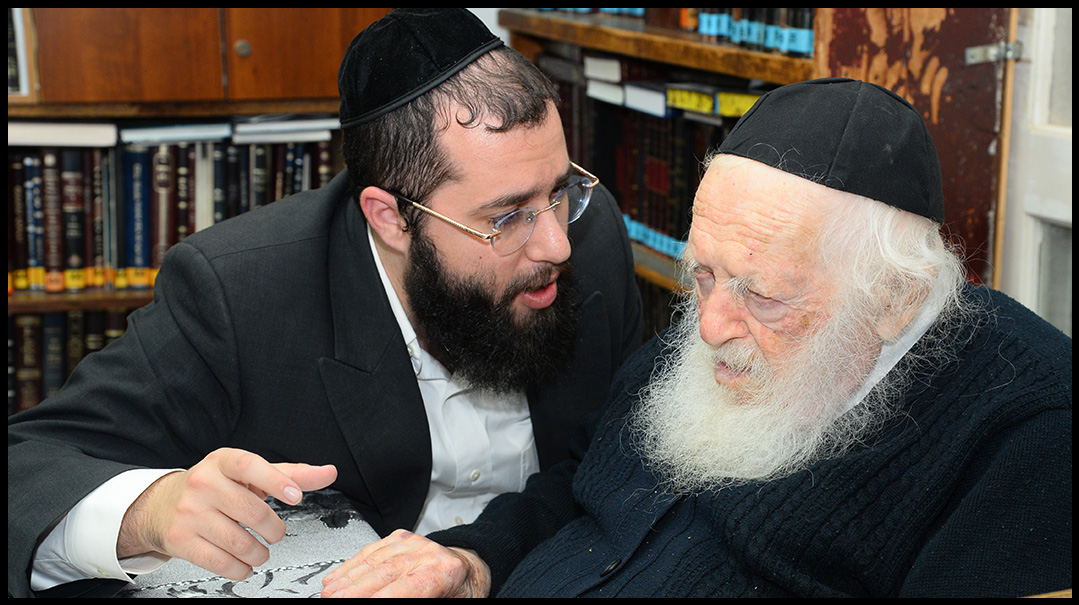
He was considered one of the most powerful people in the chareidi world, the man who directed politicians and other influencers to the desk of Rav Chaim, the one who shouted the questions to his hard-of-hearing grandfather — and the one, some accusers maintained, who set Rav Chaim’s agenda. But for Reb Yanky Kanievsky, the world’s most famous grandson, he was just a dedicated assistant to his zeide, the Sar HaTorah.
“I’m the oldest son of Saba’s youngest son,” Reb Yanky says, explaining how he was so close to his grandfather. His parents lived next door, and after Rebbetzin Batsheva passed away in 2011, his mother essentially took care of the house. Anyone who stepped through Rav Chaim’s door in recent years knew that Yaakov Yisrael Kanievsky would be there, sitting right next to his grandfather.
Yet as close as Reb Yanky was, Rav Chaim never addressed him by his first name. “I always called him Saba,” he says, “but he never called me by my name because I was named for his father, Yaakov Yisrael. So sometimes he’d say, ‘come here,’ or, ‘the son of…’ but never by my name.”
The change over a week, says Reb Yanky, is huge, and painful. “It’s just too big for me to speak about what I feel,” he says. “Too overwhelming. I grew up in his presence, in every way, from the time I was a child. Our entire life revolved around him — Shabbos, Yom Tov, every day of the year, from sitting next to him in shul and pointing in his siddur, or standing under his tallis at Bircas Kohanim, to coming for Kiddush every Shabbos morning and telling him what I was learning in cheder.”
Reb Yanky shares one of his most meaningful memories: “Five years after my wedding, we still did not have children. Two days after our first child was born, baruch Hashem, I was traveling with Saba to a family wedding in Bnei Brak when he suddenly turned to me and said, ‘You had a baby boy — I want to go for a moment to the hospital.’ I tried to tell him there was no need, and in a day or two my wife would come home, and we’d bring the baby to see him. But when Saba decided something, he was unmovable.
“I told my wife we were coming, and there was a big fuss in the ward. When we arrived, he stood next to the baby’s bassinet, took his yarmulke off from under his hat, placed it on the baby’s head, recited a shehecheyanu without shem Hashem, and blessed him that he should grow up to be a talmid chacham. Then we left. The whole thing didn’t take more than 20 seconds.
“He knew what every grandson was up to, what kind of support he needed, and in general, he had a different style of interaction with each one, based on where they were holding spiritually and their personality,” Reb Yanky continues. “You know, he wasn’t like they say today about an illui, that he’s ‘spaced out,’ he doesn’t have normal hours, he’s up at night, and the like. Saba wasn’t like that — he was the most normal person in the world. He had regular times for everything.
“My father would tell us about Saba: ‘He has time for everything.’ There was never a situation that he didn’t come to a grandchild’s wedding because he didn’t have time, or that he didn’t go with his child to cheder because he didn’t have time. My father remembers how his rebbeim would be very excited when Saba would come with him to cheder. He did all the things that a normal person does.
“People make jokes about the many stories of how detached he was. You need to understand that it wasn’t a problem with understanding, it was because he just did not want not know anything that was not Torah. He didn’t remember a single phone number by heart, even though he remembered all of Torah, because he didn’t want to remember it. The same with his ID number. Does anyone think he had a problem remembering eight digits? But he didn’t want to. It was completely his own choice.”
And, says Reb Yanky, he realized that all his accomplishments were gifts from Hashem, things he needed to ask for and couldn’t expect on their own.
“At the end of Shemoneh Esreh, he would take out his wallet and extract a paper with personal requests. When he finished, he’d put the paper back in his wallet. No one was allowed to see what it said, but one day when he took the paper out, it fell, and I saw what was written there — ‘I want to finish [name of sefer],’ or ‘I want to learn [name of sefer].’ Sometime he would cry when he read it.”
That’s because he always knew how to insist on what he really wanted.
“I know there are complaints from people that we told him what to say and how to say it, but this is both silly and upsetting,” Reb Yanky admits. “Anyone who knew him was aware that there was no such thing as someone telling him what to do or what to say. He wrote what he wanted to write, and only if he liked the wording of the letter would he sign it. He had no interest in changing anything if it wasn’t absolutely necessary, but if he didn’t want something, the world could turn over and nothing would help — not the Rebbetzin, not his children, and certainly not his grandchildren.
“I remember that at the beginning of Covid, there were all kinds of rumors of people who suddenly were collapsing in the street and dying in China. No one knew what the real truth was. We explained to Saba how dangerous it was and how much we needed to be concerned, but he didn’t pay attention to us — what we thought was not relevant. And then, when he decided it was important to be vaccinated, it wasn’t because he trusted someone who told him it was worthwhile. Of course, he heard the doctors and the medical askanim, but that was not what made him to decide to advocate for the vaccine. Even when those same doctors and askanim sounded hesitant about it, he stuck to his position and didn’t change his decision. He took the responsibility on himself and made his decision. And when he thought it was more dangerous for children to be out of school, as far as he was concerned, it was time for them to go back.”
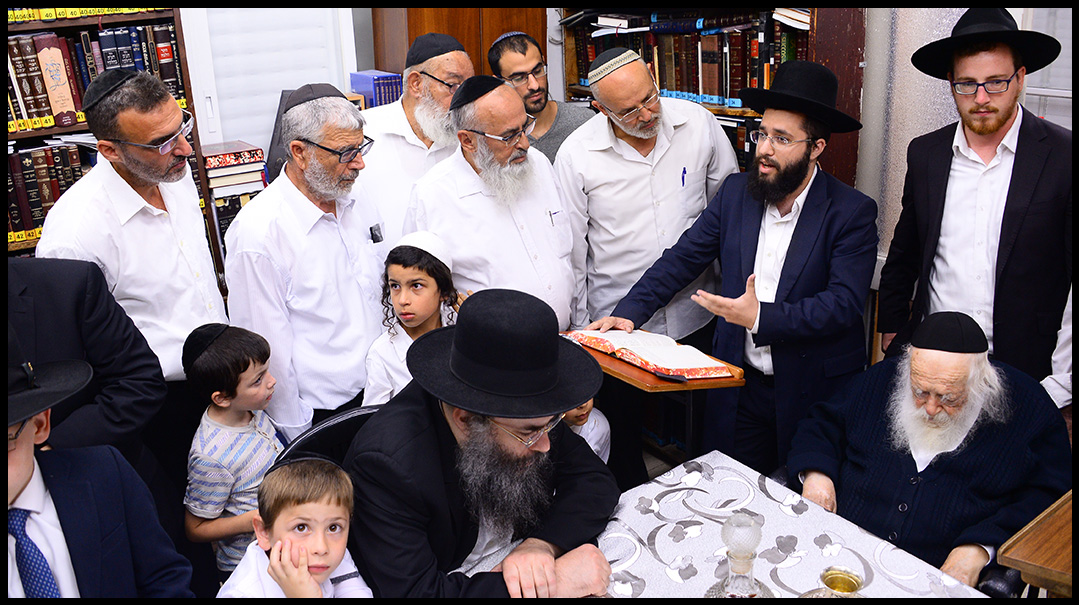
Reb Yanky remembers the days when, even though postcards and envelopes would pile up in front of him, he would “clear the desk” each day and not leave anything for the next day. And he would write each letter twice, one for the writer and the other to keep a copy for himself. When people would write him regarding names for a shidduch, he had very broad shoulders, and he had a special sense that those decisions weren’t from him — he knew that HaKadosh Baruch Hu put the words in his mouth.”
Did you figure out how he would answer specific questions? Did that influence the way he would hear the question, how you phrased it?
“There were questions where we could guide his view, but he was always able to surprise us. At the shivah, one person reminded us how he came with his son before the boy’s bar mitzvah, and the boy asked Saba if he should take upon learning daf yomi. I remember other cases where Saba answered that it was better to learn other things, but now he told the boy he should. The father told us that his son is still learning daf yomi — Saba saw in his nefesh that he was really up to it.
“One of the large Torah learning organizations invested a fortune in a special event, building a huge tent right downstairs. They brought many gedolei Yisrael and told Saba all he had to do was go into the elevator. But he refused to go down no matter what, and nothing we tried helped. I have no idea why, but that was what he decided.
“And when there was a huge election campaign gathering in Bnei Brak, he wouldn’t leave the house. People waited, they dragged out the rally, but he refused. An hour later, we told him that there was a gathering in Haifa, and he agreed. So to scream that ‘we told him’ and ‘we decided for him’ is really a bit irritating.”
There’s a rumor that in recent weeks, the Rav did not feel well, and the doctors wanted to hospitalize him, but the family refused. Why wasn’t the public told about the Rav’s weakness? Why weren’t people davening?
“As soon as Saba tested positive for Covid, I made a decision to take it to the public, despite the fact that there were others who felt there was no need, and that we could let it pass without the public knowing. But I disagreed. It was too great of a responsibility. This was a matter for Klal Yisrael. Saba was not my private property. However, the whole time, I released reassuring messages about his condition, and at the same time, asked his doctor to let me know at which point his condition required tefillos from the public, meaning if he saw a turn for the worse.
“But initially, at least, Saba seemed fine. He had no fever, and his saturation was generally normal. On Erev Simchas Torah, the doctor told me that the situation became more acute, and we got scared, so we asked the public to daven. This time, we apparently didn’t have the zechus to daven. There was a time way back when Saba was really suffering, and he would sigh every time he had to change position, but he never told us what hurt him. We would ask, ‘Saba, does something hurt?’ and he would reply, ‘That I don’t learn my chovos on time.’ When we asked, ‘What hurts you?’ he said, ‘That they disturb me from learning.’ Sometime we had to physically poke and prod him in order to figure out where the pain was coming from.
“Recently Saba was weak, but he didn’t seem to be suffering. When people wanted to come, I would tell them that the Rav was a bit weak and that we should wait a few days. Those were tough calls — we didn’t know if he could withstand more receiving the public. His dedicated driver, Reb Yeshaya Epstein, taught me not to ask Saba whether or not to let people in, because Saba would never say no.
“On Fridays, after Minchah, we would get into the car to go to the mikveh. On the side, people would approach the window — usually young bochurim with their sh’eilos, but obviously not questions of pikuach nefesh. Even when the driver closed the window and began to drive, if Saba noticed someone who had not gotten to ask a question, he would ask the driver to stop.
“After Saba’s stroke a few years back, his doctor told him that he would no longer be able to write seforim. Baruch Hashem, after many months of exercises, he did begin writing again, but at the same time, my father would help him answer letters. It was at the end of a very busy day, and in a few hours, Saba would be getting up again to begin his new day. But there was never a letter that went unanswered and no such thing as telling someone waiting outside to come back another time.
“Now, we knew he was really weak, but he was also under much better observation than he would have been in a hospital. His doctor, the department head in Ichilov, followed him with blood tests, infusion of fluids, iron, and other indices.”
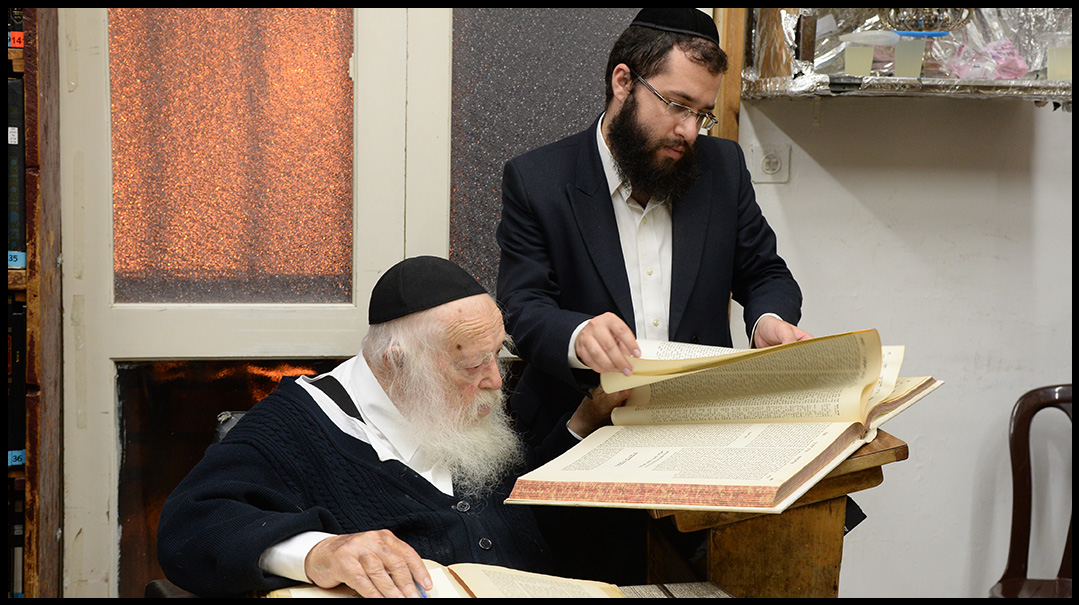
What happened this past Purim?
“On Purim night, we didn’t let too many people in, because I wanted to preserve his strength for the next day and the day after, Friday. Saba would read the Megillah on Shushan Purim as well, because of the safeik. On the morning of Purim, I was at home when I got a phone call that the Rav’s oxygen saturation level had dropped. I came right away, and on the way, I called the doctor. He told me that there was nothing to get worried about because the real index is when one is sitting, not lying down.
“We helped Saba get up from bed and sit at the table, and indeed, his saturation stabilized. At the same time, I was worried about his cough. I asked the doctor to come and check him, even though he had no fever, and we didn’t see anything that should have triggered a red alert. Usually, the doctor would send over a nurse, but this time, we asked him to come himself.
“When the doctor came and checked his lungs, he said that they were excellent and that he heard nothing out of order. The rest of the day was uneventful — Saba learned his chovos, davened Maariv, and read the Megillah. The next day, Friday morning, I sat next to him, and he was quite alert. After reading the Megillah, he gave matanos l’evyonim and mishloach manos to his driver, Reb Yeshaya Epstein, and then went to rest. After I returned home, I got another call from another cousin who was with him, saying that he was worried because the saturation was unstable.
“I got the doctor on the phone again and told him that just to be safe, he should come and check the Rav again. The doctor was not very alarmed and suggested we bring a respiratory therapist. For an hour and a half the therapist worked with him, and said he’d be back again Motzaei Shabbos. A nurse was supposed to come to give Saba fluids, and meanwhile, I saw that the saturation had stabilized again.
“When the nurse arrived, he wanted to take blood, but he couldn’t find a vein, and it was painful for Saba. I called my father to come and say Tehillim, and as we were saying Tehillim, the nurse found a vein, took blood, and connected the IV. At the same time, the oxygen concentrator continued to work, and I saw that the saturation was fine. Someone then sent me a message that he had heard Saba was not feeling well and was nearly hospitalized. I told him, ‘What? I’m here with him and everything is fine.’ The nurse wanted to leave, and I suddenly noticed that the concentrator was not working.
“I pointed this out to the nurse, but he claimed that he had turned it on and heard it working. I told him, ‘Please, check it and you’ll see.’ He took Saba’s hand to check his pulse — and there was no pulse…
“The nurse was sure it was just a malfunction and Saba would start breathing again. He began compressions, and we called Hatzolah.
“Somehow, I already knew. There was nothing Hatzolah could do — Saba had simply passed away during that one moment. The doctor, who is quite far from being mitzvah-observant, said to me, ‘This is what you call a misas tzaddik.’ Without suffering, without turmoil. It was absolute shock.
“Over Shabbos, my father resolved that we would not cry. That’s what he had seen with Saba, when his father, the Steipler, passed away. Only when Shabbos ended, and we entered the room, did we begin to sob uncontrollably.”
Many well-known personalities — including Bibi Netanyahu — came on Motzaei Shabbos to take pictures next to the tallis. Was that appropriate?
“Many people came to take their leave, but there were those that took pictures on their own initiative. What can we do? I didn’t think it was right to block any of those who wanted to come in.”
As someone who was present with the Rav for many years, is there something special you witnessed that the public was not really aware of?
“I would word it differently. Most people are not Rav Chaim Kanievsky and have no chance of being him. But there is one point that everyone can take away, and that was his power of hasmadah. I’m not only talking about his hours of learning, but also his kevius, his regularity.
“Rav Tzvi Rotberg, rosh yeshivah of Beis Meir, learned with Saba regularly for over 16 years, and through that time they covered kol haTorah kulah. Saba didn’t know how to dial a telephone or how to prepare a cup of tea, but his knowledge of the constellations or Eiruvin — which are very technical matters — was astounding. This is amazing, because he knew anything relating to learning, but whatever was not related to learning just didn’t interest him.
“Rav Rotberg mentioned that on a few occasions, Saba didn’t feel well and couldn’t even get up from bed, but when Rav Rotberg came to learn, Saba said, ‘Come, let’s learn even two minutes, so that we don’t cancel our regular session.’ For 16 years, every day, without missing a single day, even when it was impossible.”
There is a famous picture of the Rav lying on his side in bed with a large Gemara open in front of him. Was that how he always fell asleep?
“Only when he had to finish his daily chovos. He could learn for hours that way. By the way, I took that photo.”
You ran the entry system and were the address for politicians and others. How did your closeness to him and your dedication to running his household influence your personal life, your home, and your family?
“Well, there’s no doubt that my wife sacrificed a lot for it. There were times that I was there all night, on Shabbos, any time I was needed. That always came first, before any personal considerations.
And still, you were under some pressure by various entities and were a punching bag for the public who often made snide, disparaging remarks about your control of the Rav. Weren’t there moments where you felt you would crack?
“Absolutely. During the time Covid was raging, for example, I would get lots of messages along the lines of ‘you’re a killer,’ ‘you’ll have blood on your hands,’ ‘one day you won’t have the protective umbrella of your grandfather,’ and other such horrible comments. One night I was sitting and wondering why I need all this and why I was paying the price for something that I do because I believe in it. During the Jerusalem municipal elections, I could hardly walk in the street, but I accepted that this was the price paid by someone who gets involved in politics. But with regard to Covid, why was I any worse than any other grandson? It was the Rav’s personal decision. During election times, on the way to shul where I daven, the children would stand and shout all kinds of things at me, but it never escalated to a feeling of fear like I felt when facing all those anti-vaxxers.”
What comes next? How do you move on from here, the place that was the center of your life? What will you be doing going forward?
“Look, I still haven’t digested the fact that Saba is not with us anymore. I’m not really up to thinking about what comes next yet. And you know, I don’t want to sound like something I’m not. I’m not a great person, or anything close, but I do feel that at least, I can give over Saba’s main message. You know that the last letter Saba signed clearly with his hand — and for me, that’s the last letter with public significance — was the long letter that Rav Gershon Edelstein wrote about adding chizuk by learning during the days of Purim.
“Saba added that there is a Yerushalmi in Berachos that says that learning in such times brings more siyata d’Shmaya and more success. Because Saba did not leave any tzava’ah, I feel that this is his will for Klal Yisrael. He would always speak about the success of someone who becomes stronger in learning in times when learning is generally lax, like on Erev Yom Tov and Shabbos, Purim, Chanukah or bein hazmanim. When you do something specifically when it is against the current, when you overcome, then there is great siyata d’Shmaya to succeed.”
Reb Aryeh Kanievsky
“In the company of an angel, you see your own distance”
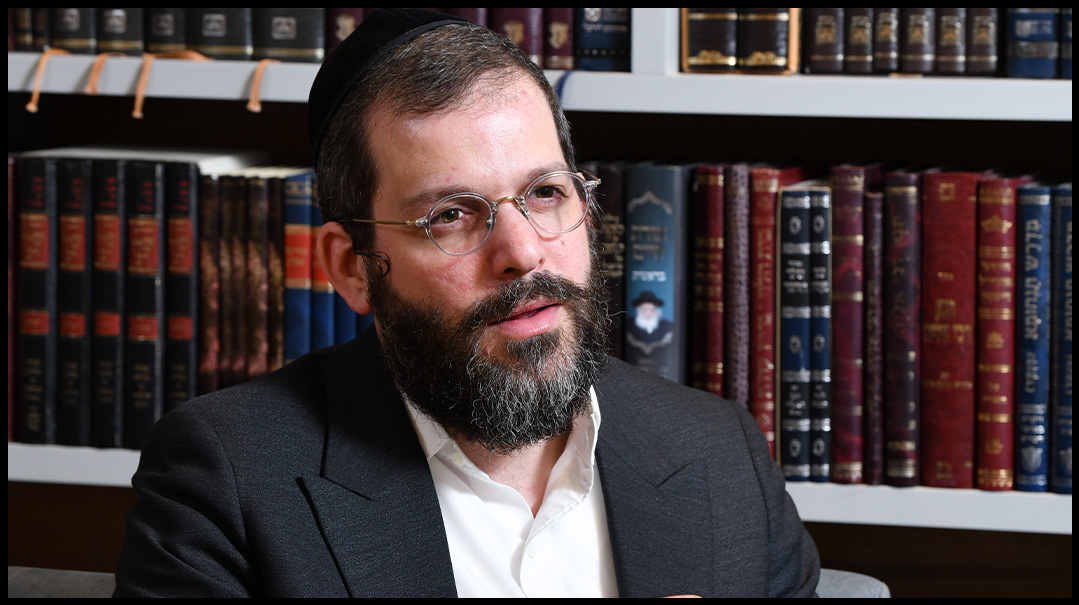
For decades, Reb Aryeh Kanievsky, son of Rav Avraham Yeshaya, served as his grandfather’s right-hand man. While he holds the official position of director of the Orchos Yosher kiruv organization, he’s straddled those responsibilities with an unofficial position as gabbai to his grandfather. Since the beginning of his married life, every moment of free time was devoted to the man he knew as Saba. Now he sits, silent and devastated, still trying to process his loss.
Because Reb Aryeh was essentially at his zeide’s side for the past 22 years. “Basically every single day since I got married, I was there,” he says. “In the early years, when there were hours for the public twice a day, I was there for an hour in the afternoon and another hour in the evening. Saba always said this was the ‘maaser zeman’ of his day, which he devoted to the public. Later on, when the visitors and requests increased, the times for kabbalat kahal got longer as well.”
Where were you when you heard the news?
“I was home on Friday when the phone rang. Someone was calling from Saba’s house – he told me something was wrong, the Rav was undergoing CPR. I ran there as fast as I could. I will never forget those words – ‘the Rav is undergoing CPR’ – at long as I live. I’ve had this strong bond with him basically since I was born. When you hear words like those, well, I can’t describe the terror. I never thought it would be over so quickly. Honestly, none of us saw it coming.
“Saba endured life-threatening moments several times. But he survived everything. When I stood on the ramp during the levayah and I saw the black van, knowing that Saba was inside, I felt like it was the greatest crisis of my life.
“In all honesty, I still can’t process that he’s not here. I imagine it will take some time before we can process it. When I came to the shivah house on Sunday morning to daven, I kept waiting for Saba to join us. I couldn’t understand what was taking him so long.”
When did you start to gain a deeper understanding of Rav Chaim?
“When I was a little boy, Saba would visit my parents’ home on Rechov Nechemia every Shabbos, a three-minute walk from his house. I used to talk with him a lot, and he would tell me stories about gedolim and ask me what I was learning. Once he asked if I wanted him to test me. I told him, ‘Whenever Saba tests me I don’t know the answers.’ So he offered to give me an easier test, and asked me a simple question. I’m guessing that he used to ask us challenging questions to give us a taste of how high we could aim in our Torah knowledge. He told me explicitly, ‘If you review the daf a lot of times, then you’ll be able to answer my questions.’
“Since I was a little boy, I had a very close bond with him. I used to daven Maariv with him at Lederman’s shul every day. At the end of davening he would grab a paper, pull off a little piece, and write a note to my father: ‘Aryeh davened nicely.’ Every single day. Once he wrote: ‘Today Aryeh wasn’t focusing.’ You know, my father kept those notes – even today, he still has hundreds of those little papers.”
Rav Aryeh then removes an old volume of Orchos Tzaddikim from the shelf. “He gave me this sefer a year before my bar mitzvah,” Reb Aryeh says as he opens it and points to the inscription: “A gift to my grandson Mar Aryeh, may it be Hashem’s will that you grow in Torah and yiras Shamayim, from your grandfather Chaim Kanievsky.” Reb Aryeh removes another book, a mussar sefer that he received two years before his bar mitzvah. Here too there is a handwritten date and inscription: “A gift to my grandson Mar Aryeh Leib, on condition that he learns from this sefer every day.”
Every grandson who reached bar mitzvah age received one of Rav Chaim’s own seforim. Most received his sefer on the mesechtos of tzitzis and tefillin. Reb Aryeh shows the inscription inside his bar mitzvah gift: “A gift to my dear grandson Aryeh Leib in honor of his bar mitzvah. May you merit to learn, teach, and observe Torah, to become a source of pride to the entire family. From Saba, Chaim Kanievsky.”
When a grandson got married, Rav Aryeh says, Rav Chaim would gift them the entire collection of his seforim when he first visited the new couple in their apartment.
How did your bond with your grandfather affect your private life?
“Saba had a stroke right after my wedding. Until then, there was no concept of a gabbai in the house, but after the stroke, I visited him every day in the hospital, and kept it up after he returned home. Before then, people would just come in whenever they wanted, but the doctor warned us that he couldn’t strain himself like that anymore. So I decided to make things more organized, more contained, to ensure Saba had some peace and quiet.”
What was it like to spend so many hours in the shadow of the gadol hador?
“When your daily reality is spent in the company of a person who’s essentially an angel, you develop your own aspirations. You see your own distance from the heights a human being can climb. Those hours with Saba gave me a desire to help other people, and to use my energies to accomplish more.
“You have to understand, I had this living example right there before my eyes. I saw a person conducting the smallest details of his life according to halachah. Once he noticed that my tzitzis were off to one side; they’d gotten tangled together. He called me over and carefully disentangled them. When I’d sit near him with a slightly folded sleeve, he would gently bend over and pull it down. He felt that a ben Torah should look dignified.”
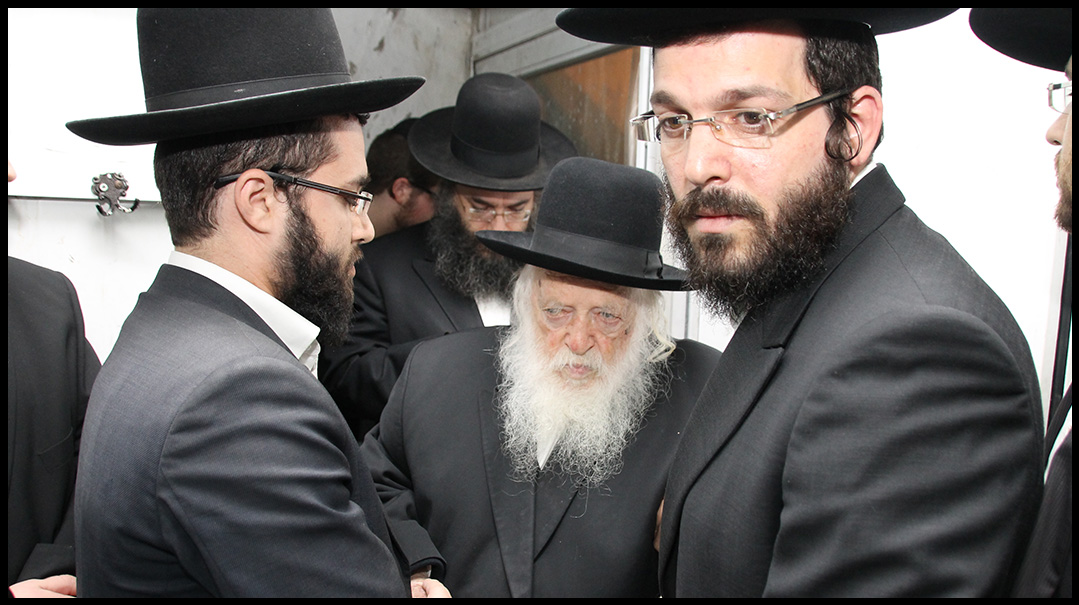
Did you get to spend time alone with him?
“Everyone knows that he used to sit down and eat lunch with the Rebbetzin every day. He never began eating without her. It often happened that the Rebbetzin was delayed in shul by the many women who came to her for advice and support. Sometimes, while he waited for the Rebbetzin to come, he would tell me stories about the Chazon Ish and ask about my family.
“One day, in the middle of their lunch, he told Savta, ‘Aryeh spends so much time here, and is so devoted to us. We should pay him for all the work he does.’ Savta agreed, ‘Of course, he definitely deserves to be paid.’ So Saba opened his wallet and took out a 20-shekel bill. ‘Is this good?’ he asked me. ‘Is it a nice salary?’ He had no idea how much it was worth. I told him that it’s a privilege for me to be with him, and that I was willing to pay him for it.
“Every day before he began to eat, he’d ask me to identify each dish and its proper brachah. That was the way he identified various foods – by their brachah. I remember how once someone came in to ask him whether bourekas are included in the prohibition against eating hot bread. Saba called me over and asked what the fellow wanted. I repeated the question, but then I realized that Saba simply had no idea what bourekas were.
“And it wasn’t just food. Once he entered a room and immediately left, very disturbed, saying that there was another person there. It was a mirror on the wall. He didn’t know what it was and didn’t know how he himself appeared. When we’d show him photos of him, he thought it was his neighbor, Rav Yehuda Shapira.
“I know it sounds strange, but Saba was not disconnected from reality. He was a family man in the full sense of the word. But he sized every possible moment to learn Torah, and that was the only thing that he valued. When I’d come to wake him after his half-hour afternoon nap, he would jump awake at once. He never said ‘give me another minute.’
“I remember that once he woke up with a wide smile. I asked him why, and he said that he’d had a difficult question on the Gemara, and while he was resting the Amora had appeared and provided the answer he was seeking.
“While he said Shefoch Chamascha at the Seder, Savta would open the door and she’d welcome Eliyahu Hanavi with a hearty Baruch Haba. ‘So Savta, how does Eliyahu Hanavi look?’ I asked her. She told me that he had a beautiful, long, white beard. ‘And what about Saba, what does Saba say? How does he look?’ I’d ask next. But Saba just smiled. The same thing happened every year.”
Why didn’t the Rav speak in public?
“He wasn’t comfortable speaking for a crowd. He never served as mesader kiddushin, except maybe once, because he claimed he wasn’t sufficiently well-versed in the halachos of gittin and kiddushin. He’d only give a shiur twice a year – a short shiur in Lederman – on the yartzheit of the Chaon Ish and the yartzheit of the Steipler.
“That said, for Saba it was imperative that a father learn with his children. When a father learns with his children, it has an influence more powerful than a rebbi’s. And it also taps the power of personal example, which Saba felt was very important. He would say that if you want to predict how children will behave and what they will value, just look at their father.”
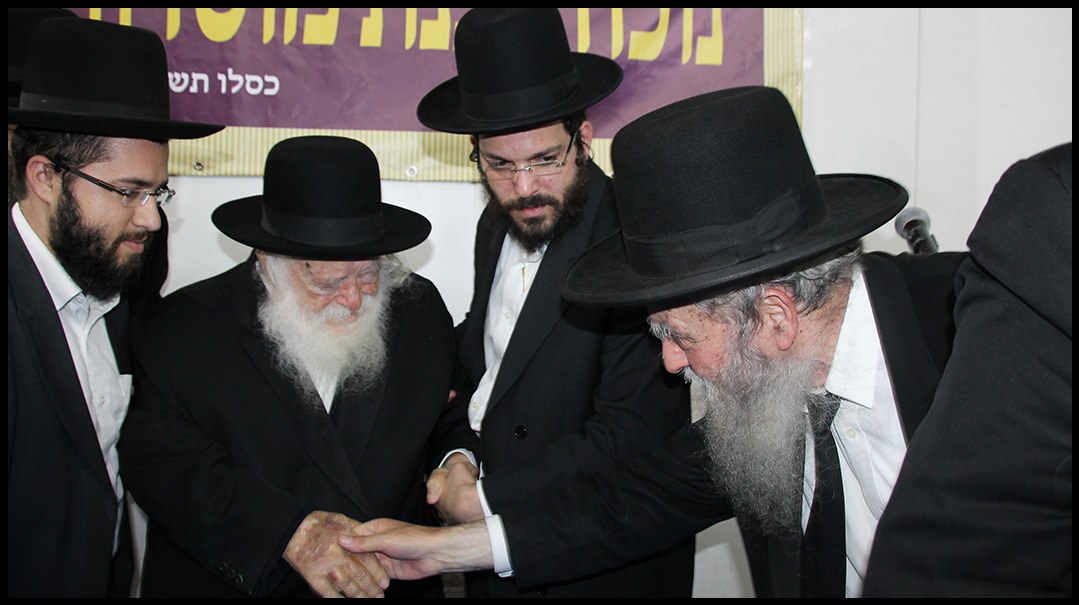
What’s in your future, now that the shivah is over?
“I run an organization called Orchos Yosher, which Saba encouraged me to launch. I’m sure it will continue to keep me busy. On a personal level, I will miss him very much. I never made a single move in life without getting his approval and blessing. We were so close that if a day passed and I didn’t come, he would ask if everything was okay with Aryeh. My entire schedule was built around him.”
The Happiest Person on Earth
By Noam Paley
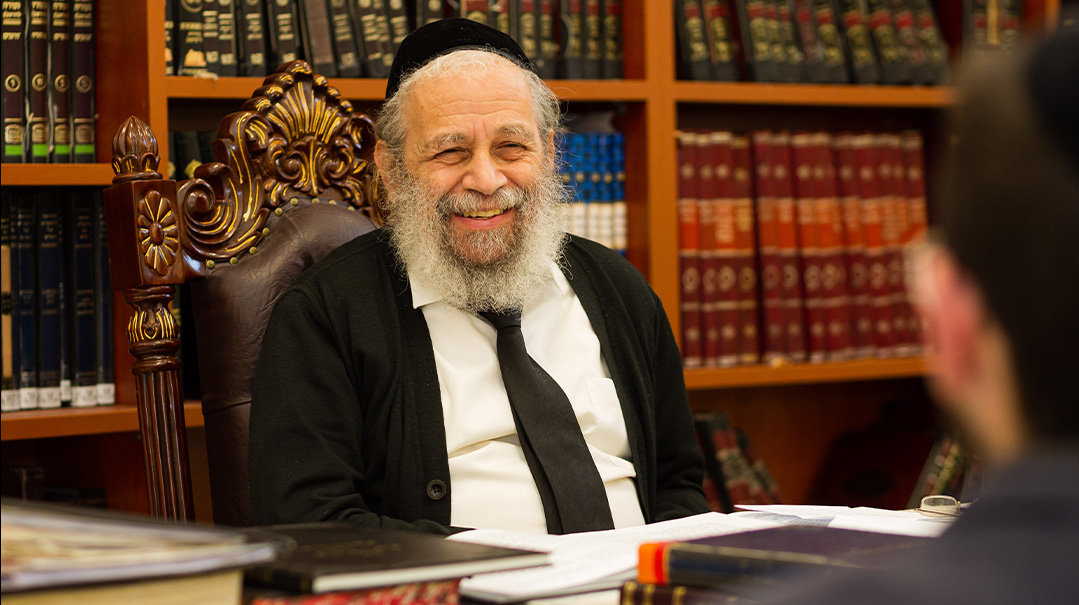
On one hand, people had an unusual desire to connect with Rav Chaim: the yeshivah bochurim who would send him questions in learning, though they knew the reply might be a one-word answer on the edge of the envelope; the fathers who brought their chalaka yingelach to have a curl snipped; the cheder boys who came to be tested on Mishnayos; those who came from overseas and waited for hours just to stand there for a few seconds and hear a terse syllable or brachah from him. Many people, far from the Rav’s world, changed their clothing, their external appearance, even their names, after a quick encounter of a few seconds with him.
Yet at the same time, it’s hard to think of a figure more distant than Rav Chaim Kanievsky. It wasn’t only his outstanding hasmadah, or his unfathomable breadth of Torah knowledge. His conduct, his way of learning, the way that he answered questions or gave brachos – it all seemed taken from another world.
Rav Shaul Gabbai, rosh yeshivah of Imrei Da’as in Jerusalem’s Bayit Vegan neighborhood and founder of the Hashivah Shofteinu kollel, had the privilege of a regular learning session with Rav Chaim.
It began in 2015, when Rav Gabbai’s yeshivah embarked on building its new beis medrash. At the same time, Rav Gabbai himself began an ambitious new learning project.
“I was afraid that the building undertaking would distract me from my learning, so I doubled down,” he says. “I set out to learn the sugya of the Mikdash and its keilim, and then write a kuntres on it. It isn’t a widely learned sugya, and I looked for someone who was familiar with it, with whom I could discuss my questions.”
He search led him to Rav Chaim. “I came to Rav Chaim and found an open door,” Rav Gabbai says. He would come every two weeks to Rav Chaim with a concise list of complex questions, and Rav Chaim would answer immediately.
“He would simply look at them — he never needed further perusal or to open a sefer — and then answer,” he says. “Everything was so organized, so clear, and so very alive.”
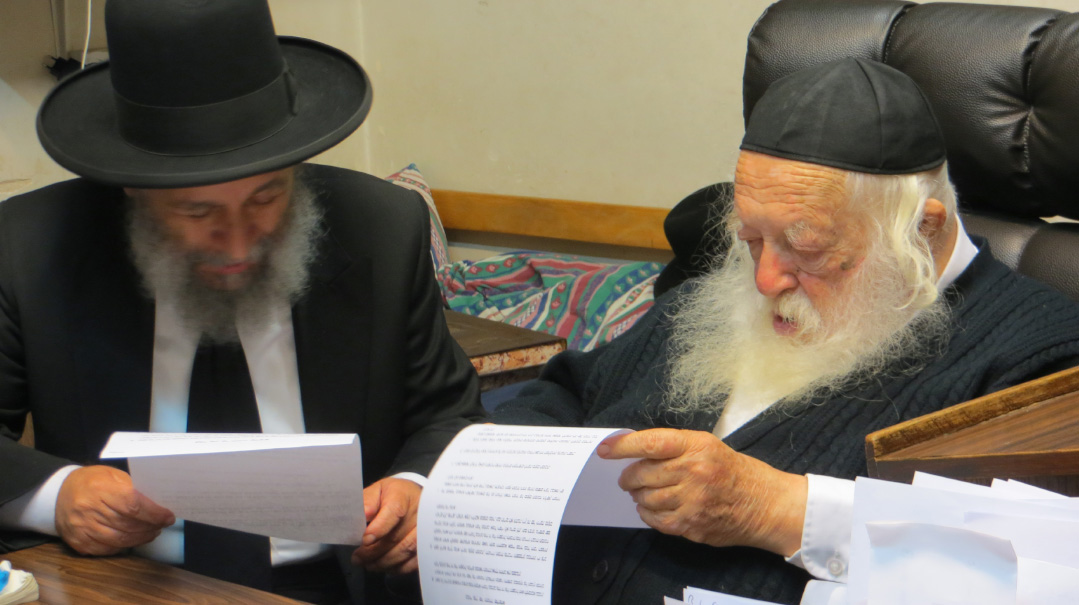
Rav Gabbai says he got a glimpse at what he feels played a big part in Rav Chaim’s unique hasmadah and unbelievable Torah knowledge: his menuchas hanefesh. In a generation characterized by frenetic activity, Rav Chaim was a rare oasis of peace.
“He was a very easygoing person,” Rav Gabbai says. “I don’t know people in this generation with such an easy temperament. He was completely available, all the time, whenever he wanted, to do what he wanted.
“And it was this menuchas hanfesh that enabled him to turn away from all distractions of This World. He didn’t run after anything. He didn’t take one step in order to advance himself. He didn’t pursue anything, and he had no need for anything that disturbed him. He knew that the main thing for him was to focus his attention in learning. No other problems touched him.
“In my eyes, this menuchas hanefesh is the greatest trait he had, which helped him get to where he did. It allowed him to have such clarity in his learning, and gave him his clear power of decision, the ability to fulfill and to use what he had learned, to know where to use every psak.”
This single-mindedness made Rav Chaim the happiest person on this earth, Rav Gabbai says. “True, he was an adam gadol, but anyone who went in to him emerged happy. Because in order to reach a state of joy, a person has to be at peace with himself. He has to have peace between all the different layers of his personality, which often pull a person in different directions. But for Rav Chaim, there were no contradictions. He saw everything through the lens of Torah, and that enabled him to live in unbelievable peace with himself.
“And that’s also how his Torah looked: whole, clear, lacking doubts or contradictions. It’s the Torah of a person who merited true inner peace.”
Rav Gabbai shares a personal story illustrating the simplicity Rav Chaim brought to thorny dilemmas.
Before his yeshivah moved to its current location, they were considering a different offer, where the building was more centrally located, and much cheaper. Rav Gabbai went to consult Rav Chaim, who asked him about the differences between the two options. Rav Gabbai told him that the more expensive building was in a quieter area, and that’s was why the price was higher.
Reb Chaim asked him why he wouldn’t buy the building in the quieter area, which was more optimal for a yeshivah. Rav Gabbai explained that he didn’t have the money, but Rav Chaim seemed unperturbed.
The donors can give more, he suggested to Rav Gabbai. And also answered in the affirmative when Rav Gabbai asked if they could take a bank loan, even though Rav Chaim was generally stringent about taking loans with interest
One of the regulars in Rav Chaim’s house couldn’t believe the answer. “He said, ‘There is no chance Rav Chaim said that. He must not have understood the question.’ So we went back to Rav Chaim, who gave the same answer again,” Rav Gabbai remembers. “But the person still wasn’t calm, and went back a third time, asking the question again, in Yiddish. And for the third time, in Yiddish, Rav Chaim gave the same answer.”
Because from Rav Chaim’s pure Torah perspective, it was all very simple. You need to buy the expensive building, because for a yeshivah, you do the best thing. You don’t have to worry about money; as it is there isn’t enough money! You can ask donors for help, and you can take a bank loan – because the yeshivah also has real estate assets, which was a relevant halachic factor. For Rav Chaim, each part of the answer had a very simple explanation.
People facing all sorts of troubles found their way to Rav Chaim, hoping for a brachah and direction, but he never seemed bowed under the weight of all he heard. “He was calm because he made sure not to worry about things he wasn’t supposed to worry about, things that weren’t in his control. He worried about finishing Shas; he worried about filling his chiyuvim.”
It’s widely known that Rav Chaim simply refused to know what wasn’t vital for him, including the names of the streets in Bnei Brak. “He wasn’t disconnected from the world – he simply saw it through a very clear partition,” Rav Gabbai says. “It was clear to him what was on his side and what was on the other side. He was ready to dedicate his strength and efforts to influence another Jew. But he wasn’t ready to put himself into someone else’s business. He wasn’t ready to allow this distraction to affect his most unique inner peace. He knew that he had another role.”
(Originally featured in Mishpacha, Issue 905)
Oops! We could not locate your form.

